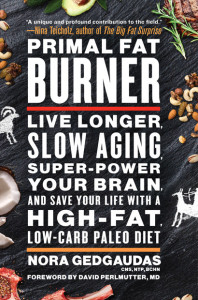
Since the release of my book, Primal body-Primal Mind I’ve been admittedly somewhat flabbergasted by the overwhelming number of reports from people who are finding their transition to a low/no carb (no sugar/starch) lifestyle amazingly smooth and easy. I actually expected more reports of problems, complaints (whaddaya MEAN “no bread?”), lamenting and gnashing of teeth…But lo-and-behold…people are really getting it, applying themselves and finding it surprisingly easy to do away with those very things they once believed they simply could not live without.
Still–This one remains a biggie for more than a few people. Not everyone knows how to face a life without bread, cereal, pasta, rice, potatoes and even desserts. There are even still a few that have trouble fathoming the idea that grains aren’t exactly a “health food”…in spite of the overwhelming evidence to the contrary. Many people are addicted to these foods in some way and feel deeply resistant to the idea that their “carbovore” days are numbered if they want to truly be healthy, weigh less, feel and function better cognitively and emotionally and live a longer and disease-free life. –Let’s just say that a lot of people don’t bother attempting necessary change in their lives until the pain of the problem finally exceeds the pain of the possible solution. –With any luck, by then it won’t already be too late.
For too long people have perceived “health” in this country as something you have as long as you manage to find yourself above ground in the morning and are able to make it to work and back without landing in the hospital or the morgue. Most people have gone about their lives eating whatever it is they felt like—some treating their bodies with even more indifference than their automobiles with the idea that “well, if it breaks down I’ll just bring it into the shop”. Others more well meaning are easily seduced by labels on cardboard boxes and frozen packages reading “healthy and natural” or “low fat/low cholesterol” and have been grossly misinformed by corporate interests that have managed to convince them that nothing could be more natural or healthy than getting your meal out of a cardboard box. It’s not overly “conspiracy theorist” to assert that there are a considerable number of vested mainstream interests determined to keep the public ignorant and confused about what really constitutes health and what it actually means to eat a healthy diet.
Well, health is much more than the absence of disease…and what we choose to eat really does matter. –And with what amounts to the basic collapse of health care on our collective horizon it matters now perhaps more than ever. No person who can’t afford to get sick can afford to eat poorly. Prevention—TRUE prevention is pennies on the dollar compared with the alternative. Quality nutrition isn’t an elitist concept, as it might seem for some. It’s a far more attainable and affordable goal than most might think. Where fully 90 cents out of every dollar spent on food in this country is being spent on processed “food” one can literally save 90% of what they are spending right now on their grocery bills and turn this savings around to spend on REAL food that will nourish and sustain health–potentially even at a fraction of the cost. The real secret lies in how you choose (yes, choose) to metabolically adapt your body—whether you choose to depend upon sugar or upon fat as your primary source of fuel –The more you can come to depend upon fat as your primary source of fuel the longer you will live and the healthier you will be…by FAR.
Eating a low/no carbohydrate (sugar/starch) diet is not the only key to this equation, and my book, Primal Body-Primal Mind clarifies this in considerable detail….but eliminating sugar and starch are without question a key first step along the path to optimizing the health of your body and brain. In my book, Primal Body-Primal Mind I exhaustively make the case for the elimination of sugar and starch from the diet as a central goal in the support and recovery of optimal health. The evidence for this is overwhelming and the benefits FAR outweigh the initial sacrifice of petty indulgences. Soon…in fact, sooner than you would ever think the cravings for these petty indulgences become little more than a blurry, happily forgotten memory.
By simply eating sugar and starch you compel your body to burn and/or store them for fuel, as the body is obsessed with maintaining the lowest necessary level of blood sugar at any given time and is driven to process sugar quickly. All carbohydrates–simple or complex, natural or refined–by the way, are “sugar” once they hit the bloodstream. Over time this establishes a “physiological expectation” and a basic dependency. Our natural state–one our ancestors maintained for millenia–is one where we depend upon and burn fats and ketones as our primary source of fuel. Nature simply wouldn’t have been so stupid as to innately make us dependent on something so volatile and undependable as sugar (glucose) all of the time. Fat is an even, long burning, readily stored and aerobic source of fuel by design. Sugar or glucose is anaerobic, rapidly metabolized “rocket fuel” for us designed mainly to be used in an emergency–not as every day/all day energy. It is designed to be used quickly for short periods or bursts of time. As long as one elects to depend on sugar as their primary source of fuel by feeding this monster carb cravings WILL persist. They’d have to. As long as you depend upon kindling (i.e., sugar/starch) to fuel your metabolic fire then you will forever be a slave to that fire and to the craving beast. If, however, you learn to adapt yourself to instead depend upon that most natural of long, sustainable burning fuels—i.e., natural fat—then you have truly tamed the carb craving monster once and for all…and you have established the single most critical preventative tool in your personal health care arsenal: a ketogenic metabolism. The benefits of this are too numerous to mention, as are the consequences of the alternative.
There is, of course, another element of carbohydrate craving to be considered. For many out there carbohydrate cravings are directly connected to deficiencies in a key neurotransmitter needed for positive mood and healthy cognitive functioning: serotonin. Serotonin is manufactured throughout the body and brain (95% actually produced in the gut) from the amino acid, L-tryptophan and vitamin B6. Iron, too, is needed for this conversion. It just so happens that L-tryptophan (devoid in grains, by the way) is the single most deficient amino acid in our diets. Faulty digestion in many people and poor hydrochloric acid production also very commonly lead to such amino acid deficiencies. Carbohydrate consumption (sugar and starch) create a temporary surge in serotonin and concentration of tryptophan in the bloodstream and brain—leading to a temporary improvement in mood. All this sounds good until you realize that carbohydrates do nothing to manufacture new serotonin and only serve to deplete it and perpetuate additional carbohydrate cravings over time. –In fact, this particular issue may be the single greatest cause for seemingly intractable, persistent carbohydrate addiction and cravings in many, many people.
Proper levels of estrogen and essential fatty acids such as omega-3’s are also needed for the proper functioning of serotonin receptors. Menopausal issues and hormonal dysfunction are therefore fertile ground (no pun intended) for carbohydrate cravings. Omega-3 deficiencies are among the most common of nutrient deficiencies in the Western diet. As if all this weren’t bad enough low light conditions in winter also impair serotonin production, generating seasonal cravings and mood disorders. Even mild iron anemia can impair proper conversion from L-tryptophan to serotonin.
So…with all that potentially conspires to derail the best of low carb intentions what can a person do to actually tame this carb craving monster once and for all?? Take heart—it’s easier than it sounds. For most individuals it really does seem to be as easy as eliminating sugar and starch from the diet and using dietary fat to satisfy the appetite. Mild tendencies toward temporary symptoms of reactive hypoglycemia while the body adapts over a 3-6 week period can be easily managed with the use of the amino acid L-glutamine. –Just ½ tsp of powdered L-glutamine under the tongue 2 or 3 times a day (or as needed) seem to be sufficient for most. The brain can use L-glutamine in lieu of glucose while metabolic conversions to fat and ketone burning over sugar burning are taking place. The additional use of 4,000-8,000 mg, three times per day of the herb Gymnema sylvestre can improve insulin sensitivity and utterly kill carb cravings in almost anyone. Actually getting Gymnema on one’s tongue by chewing Gymnema tablets or liquid can even destroy your ability to so much as taste sugar for a few hours—a cruel (perhaps) but effective tool in indulgence management….suitable for curbing all sweet temptations at holiday parties. I see both L-glutamine and Gymnema as essentially temporary “bicycle training wheels” for that “sugar burning” to “fat burning” metabolism transition period.
It can take a little detective work to ferret out the cause for persistent and seemingly maddeningly resistant carbohydrate addiction in some, however. For each of the following carb-relinquishing obstacles I’ve provided the following simplified suggestions to consider:
- Poor protein digestion (characterized by gas, bloating, belching and reflux symptoms following meals) leading to poor amino acid production and deficiencies. You may be able to address mild hydrochloric acid insufficiency status by first eliminating starches and sugar with meals containing protein, avoiding drinking excess liquids with meals, moderating protein portion size at mealtime, chewing protein foods well and eating in a relaxed environment where stress and distraction is minimized. Adding raw apple cider vinegar to salads and/or sipping a mixture of two tablespoons of cider vinegar in warm/hot water with protein containing meals can also help. If gas and/or bloating/belching/reflux symptoms following meals continue to be an issue you may wish to include some hydrochloric acid supplementation with HCl tablets or capsules at mealtime.
- Carb cravings driven by depression or anxiety related symptoms can most often be managed via the proper use of the amino acid supplement, L-tryptophan. Try L-tryptophan capsules, taken carefully on an empty stomach, one 500 mg capsule at a time every half hour until the desired effect is felt. Try not to exceed 3,000 mg per dose and pay careful attention to shifts in well being while finding the correct dosage. As soon as a feeling of improved well being is noticed this becomes your personal dosage. Taking L-tryptophan in the late morning/early afternoon and again on an empty stomach shortly before bedtime (if insomnia is additionally an issue) is best. It is important that extra B-complex containing vitamin B6 is taken with meals also to assist in the conversion of L-tryptophan to serotonin. Watch for excess serotonin side effects (e.g., stomach discomfort, sleep or mood problems). Reduce dosage or discontinue. Powdered vitamin C in water can often help minimize discomfort if excesses are accidentally taken. L-tryptophan supplementation is contraindicated, by the way, if you are currently taking antidepressant medications!
- SAD (seasonal affective disorder) related carbohydrate cravings can best be managed by first obtaining a light box that emits a minimum of 10,000 lux and using it daily according to the instructions. For most individuals this is sufficient to curb the relentless drag of low mood and energy during the day and can help restore healthy production of serotonin. If the light box doesn’t quite cut it entirely, see above instructions for L-tryptophan supplementation. Also, vitamin D deficiency has additionally been found to be an issue in SAD and proper vitamin D testing and supplementation may be recommended (see my chapter on vitamin D in Primal Body-Primal Mind).
- Menopausal-related symptoms of depression, anxiety or insomnia leading to enhanced carbohydrate cravings can often be managed using the amino acid, L-tryptophan, as well (see previous above for instructions).
- Essential fatty acid (EFA) deficiency leading to impaired serotonin receptor activity can be managed nicely with increased omega-3 supplementation. For EFA deficient individuals strive for about a teaspoon of omega-3 fish oil (not cod liver oil) for about every 40 pounds of body weight, or one capsule for every 10-15 pounds of body weight (liquids are far more economical, simple and effective for this). Using Antarctic krill oil capsules one can often get by with half the number of capsules per day. Do not attempt substituting supposed “omega-3 flax oil” for this. If in doubt, it can’t hurt to take omega-3 fish oil!
- Known or suspected mild iron anemia in a non-vegetarian can most readily be managed by simply improving hydrochloric acid (HCL) status, which typically involves supplementing with HCL tablets or capsules at protein-containing meals. HCL is needed for proper mineral ionization and absorption/utilization and is a common cause of poor iron status. Additionally, consuming iron containing foods from primarily heme sources (red meat, liver) is best. Vitamin C can also improve iron absorption from non-heme sources. Note that although there is some iron content to spinach, oxalic acid in spinach generally renders this iron content poorly available. Cooking or steaming spinach helps neutralize oxalic acid and can somewhat improve iron availability (along with added vitamin C)…but don’t overestimate the quality of the iron you are getting from plant foods.
In short, the carb craving monster isn’t anywhere near as formidable as it seems and with a few simple tools, a little detective work and determination this health destroying behemoth can easily be reduced to little or nothing…along with your future health care costs.
~ Nora Gedgaudas




It is so helpful to receive this reinforcement from you. My family is past 30 days off of sugar and carbs and we can not believe how incredible we feel! I am still trying to let go of how duped I was about the USDA Food Pyramid and will try to help others see this non-scientific food farce for what it is!
Nora, truly a great post. I have been paleo for quite some time but I seem to notice the carb craving monster on two occasions: 1) when it is the time of the month and 2) when stress/anxiety occurs.
I was wondering if you could offer your advice on which supplement to take when it comes to L-tryptophan vs. 5-HTP?
Thank you for continuing to educate us and lead healthier lives!
Thanks for you kind comments!
When it comes to L-tryptophan vs 5-HTP, both can have a positive effect, but I tend to lean toward recommending L-tryptophan more often as it is less likely to adversely affect sleep. 5HTP can enhance cortisol levels which, apart from a few exceptions (i.e., total adrenal exhaustion), usually isn’t that desirable.
Brand-wise I’m inclined to recommend Pure Encapsulations or Lidtke brands, if you can get them, as they are additive and magnesium stearate-free.
I hope this helps!
~Nora
Thank you so much Nora!
I’ve actually started 5-HTP almost 2 weeks ago and to be honest other than slightly helping with sleep issues, I have not seen any true positive results when it comes to mood enhancement and taming the carb cravings (from anxiety). My daily dosage is 100mg first thing in the morning on an empty stomach and I don’t eat anything until a few hours later.
I think I will go and give L-tryptophan a try. The quick research I did on google also seems to imply that it is the more ‘natural’ way to go.
Again, thanks Nora. =)
4000-8000mg of Gymnema three times a day????
Is this a misprint? I have a bottle of Gymnema silvestra which contains caps of 300mg and the directions say to take it 2 times daily before meals. And btw, this bottle of 90 caps cost $28.49 at my healthfood store. Quite expensive. Though I have since found cheaper sources on the internet.
I have just found your site through your interview with Jimmy Moore. I’m in the process of working my way through it and am already taping your radio programs from VoiceAmerica.com.
Thank you!
Yes–you read right. Not a mis-print. Gymnema really works–but my experience (and research) suggests much greater amounts are needed by most than typically come in commercial supplements. Instructions on almost any supplement bottle for anything are virtually meaningless, by the way. Standard Process/Medi-Herb, a healthcare practitioner brand, sells relatively inexpensive Gymnema in 4,000 mg tablets that are actually pretty easy to swallow. It’s a superb product, but you’d need to go through a natural health care provider in order to obtain it. It isn’t sold in stores or on the Internet.
Go ahead and try what you have and see what happens. It may work for you. If it doesn’t, though, I’d find a more concentrated source. They’re out there.
Hi Nora,
Love this post! Question: how do you feel about digestive enzyme supplements to aid in protein digestion?
Thanks!
Thanks, Jim! In general I see primary problems surrounding protein digestion to be hydrochloric acid insufficiency related–which readily gives rise to pancreatic insufficiency issues. I would always correct hydrochloric acid insufficiency first.
Hi Nora-
What do you think fruit? I find if I have some I get crazy cravings, but on the other hand, I sometimes need to just KNOW there is something simple and fast I can have at school. I am really trying to stop eating fruit as it really leads to cravings. Do others have this experience?
In short, yes. ANY taste of sweet can trigger more sweet cravings–particularly in carb sensitive people. You may need to omit all fruit from your diet, at least for a time, until your body becomes better adept at utilizing and depending upon fat as its primary fuel source. For snack food ideas, please see the appendix at the back of my book. There’s a lot you can do for that. You’ll find in time, however, that snacking becomes less and less of a necessity.
Hi Nora,
I’m eating according to the suggestions in your book. I made it past the carb craving and constant hunger and now feel great…except in the afternoon/evening after I workout. On exercise days I get my old symptoms of mineral deficiency: headache, heavy stomach, heartburn (not helped by HCL), and sluggish digestion back. Any thoughts? Is this more than a mineral deficiency?
More info: I exercise in the morning and stick to paleo like exercises such as 10min. body weight exercises 1-2x/wk, 30min. very low intensity jog 1x/wk, and five 20 sec. sprints 1x/wk. On days that I only go for a walk or no exercise, I don’t have symptoms. Daily I take 500mg of magnesium, 500mg of potassium, and 1/2 t fermented cod liver oil. On days I do more than just go for a walk, I’ve started taking ConcenTrace Stamina Electrolytes. I think they are helping some.
I’d appreciate any help you could give because this has been such a puzzle to me. I feel so much better and enjoy the exercise but obviously not the fallout.
Thanks!
I cannot offer medical advice but you may wish to get a breath urea test the most accurate and also least invasive means of diagnosis) to determine whether you may have possible H.pylori overgrowth. I cannot account for the strange symptoms, otherwise. Sounds like you are doing some good things, but it’s hard to know for sure without doing a more thorough and detailed evaluation. I hope this helps!
Hi Nora,
I just read your helpful article “taming the carb cravings” and I will definitely be trying the hcl and omega 3s.
I’ve been on a meat and starchy veggies only diet for 1 month and still having a lot of carb cravings and exhaustion.
I am on antidepressants so it sounds like the L-tryptophan is out…? Any other options?
Also, I saw in a previous post that you said that eating anything sweet can trigger the sweet cravings, does that apply to things sweetened with stevia?
Thanks for your help,
Brenna
Thanks again for your great efforts. This posting is very accurate. Still……I take exception to one aspect…..
You rightly chastise the corporate interests that work to perpetuate the myths of “healthful” eating……..yet seem to give all the establishment government, medical and nutritional practitioners a pass.
In many respects these folks are just as criminal……maybe more so…….than companies with a financial interest.
WHY? Because so called “health” and government related people should educate themselves to know better.
Is their fraudulent healthy eating advice just from a follow the herd instinct or from laziness or is it actually from a purposeful self interest in seeing the health of Americans decline?
Yep, finally broke down yesterday after a 2/3 hour sob session & some really nasty, bizarre dreams & began eating carbs again. I thought I should probably try to ween myself down but now I have some kind of hope to begin again immediately!
Thanks!
For poor protein digestion, try digestive enzymes containing protease. This is the enzyme that digests protein specifically. Acid is only the crude beginnings of digestion. The enzymes do the major work. Alternatively, try raw meat, dishes like beef tataki, beef caparccio, steak tartare, etc. By not cooking the meat, you are keeping those critical enzymes alive in your digestive tract where they are able to do their job of breaking down the meat. This is how we ate meat for millions of years. As it’s been said countless times, we are the only species that cooks its food. From personal experience I can say that raw meat is as easy to digest as fruit, which means you are also left with far more energy than if you had eaten a cooked meat meal.
Also, tryptophan should be taken several hours apart from B6, as the conversion to serotonin has to take place within the brain. Serotonin in the blood does not cross the blood brain barrier. You want the serotonin to be manufactured *inside* your brain, not outside it. Taking these two supps apart will give you a better chance of this happening. I’ve also read that conversion outside the brain can cause issues with the heart if taken over a long time, though I’m not sure of the complexities of this. (Obviously this is not related to serotonin that occurs in the gut. I am talking about serotonin in the blood stream.)
“The additional use of 4,000-8,000 mg, three times per day of the herb Gymnema sylvestre can improve insulin sensitivity and utterly kill carb cravings in almost anyone.”
That seems quite excessive… Do you mean 400-800 mg? Most research supports this.
The health care practitioner supplement line, Standard Process has a separate Herb product line called “Medi-Herb” that offers a Gymnema product. It provides “400 mg of Gymnema leaf 10:1 extract” derived from 4,000 mg (4g) of raw herb per tablet. This is the brand I have commonly used for clients, but Medi-Herb is not available outside of health care providers and their patients. ~ Nora Gedgaudas